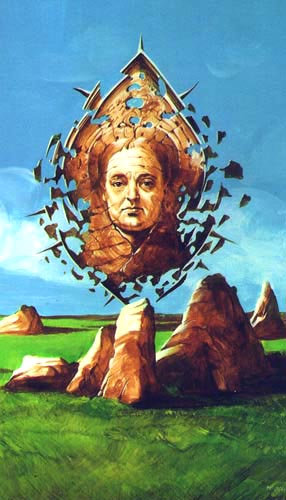Selected passages from the Azhar Book
& teachings of the Bene Gesserit
"Speak the truth. That
is always much easier, and is often the most powerful argument".
"If you believe certain words, you
believe their hidden arguments. When you believe something is right
or wrong, true of false, you believe the
assumptions in the words
which express the arguments. Such assumptions are often full of
holes, but remain most precious to the convinced".
"Many creatures bear the outward form of a man, but do not be fooled
by appearances. Not all such life-forms can be
considered human".
"Seek freedom and become captive of your desires.
Seek discipline and find
your liberty".
"When you think to take determination of your fate into your own hands, that
is the moment you can be crushed. Be cautious. Allow for surprises. When we
create, there are always
other forces at work".
"There's no secret to
balance. You just have to feel
the waves".
 "Confine yourself to
observing and you always miss the point of your life. The object can be
stated this way: Live the best life you can.
Life is a game whose rules you
learn if you leap into it and play it to the hilt. Otherwise, you are caught
off balance, continually surprised by the shifting play. Non-players often
whine and complain that luck always passes them by. They refuse to see that
they can create some of their own luck".
"Confine yourself to
observing and you always miss the point of your life. The object can be
stated this way: Live the best life you can.
Life is a game whose rules you
learn if you leap into it and play it to the hilt. Otherwise, you are caught
off balance, continually surprised by the shifting play. Non-players often
whine and complain that luck always passes them by. They refuse to see that
they can create some of their own luck".
"One cannot hide
from history... or from
human nature".
"Technology, in common
with many other activities, tends toward avoidance of risks by investors.
Uncertainty is ruled out if possible. Capital investment follows this rule,
since people generally prefer the predictable. Few recognize how destructive
this can be, how it imposes severe limits on variability and thus makes
whole populations fatally vulnerable to the shocking ways our
universe can
throw the dice".
"Quite naturally,
holders of power
wish to suppress wild research. Unrestricted questing after
knowledge has a long history of producing unwanted competition. The
powerful want a “safe line of investigations,” which develop only
those products and ideas that can be controlled and, most important,
that will allow the larger part of the benefits to be captured by
inside investors. Unfortunately, a random universe full of relative
variables does not insure such a “safe line of investigations.”
"We could be
dreaming all the
time, but we do not perceive those dreams while we are awake because
consciousness (like the sun obscuring stars during the day) is much
too brilliant to allow the unconscious content so much definition".
"The less we know, the
longer the explanation".

...On
Universe
"Perceptions rule the
universe".
"The search for an ultimate,
unifying
explanation for all things is a fruitless endeavor, a step in the
wrong direction. This is why, in a
universe of chaos, we must
constantly adapt".
"The one-eyed view of our
universe says you must not look far afield for
problems. Such problems may never arrive. Instead,
tend to the
wolf within your fences. The packs
ranging outside may not even exist".
 "There
are no facts — only observational postulates in an endlessly
regenerative hodgepodge of predictions.
Consensus reality requires a
fixed frame of reference. In a multilevel, infinite universe, there
can be no fixity; thus, no absolute consensus reality. In a
relativistic universe, it appears impossible to test the reliability
of any expert by requiring him to agree with another expert. Both
can be correct, each in his own inertial system".
"There
are no facts — only observational postulates in an endlessly
regenerative hodgepodge of predictions.
Consensus reality requires a
fixed frame of reference. In a multilevel, infinite universe, there
can be no fixity; thus, no absolute consensus reality. In a
relativistic universe, it appears impossible to test the reliability
of any expert by requiring him to agree with another expert. Both
can be correct, each in his own inertial system".
"At the
quantum level...
our universe can be seen as an indeterminate place, predictable in a
statistical way only when you employ large enough numbers. Between that
universe and a relatively predictable one where the passage of a single
planet can be timed to a picosecond, other forces come into play. For the
in-between universe where we find our daily lives,
that which you believe is
a dominant force. Your beliefs order the unfolding of daily events. If
enough of us believe, a new thing can be made to exist.
Belief structure
creates a filter through which chaos is sifted into order".

...On
Religion
 "Religion (emulation of adults by the child) encysts past mythologies:
guesses, hidden assumptions of trust in the universe, pronouncements made in
search of personal power, all mingled with shreds of enlightenment. And
always an unspoken commandment: Thou shalt not question! We break that
commandment daily in the harnessing of human imagination to our deepest
creativity.
"Religion (emulation of adults by the child) encysts past mythologies:
guesses, hidden assumptions of trust in the universe, pronouncements made in
search of personal power, all mingled with shreds of enlightenment. And
always an unspoken commandment: Thou shalt not question! We break that
commandment daily in the harnessing of human imagination to our deepest
creativity.
"All
organized religions face a
common problem, a tender spot through which we may enter and shift
them to our designs: How do they distinguish hubris from
revelation"?
"Religion often
partakes of the myth of progress that shields us from the terrors of
an uncertain future."
"These are
illusions of popular
history which a successful religion must promote: Evil men never
prosper; only the brave deserve the fair; honesty is the best
policy; actions speak louder than words; virtue always triumphs; a
good deed is its own reward; any bad human can be reformed;
religious
talismans protect one from demon possession;
only females
understand the ancient mysteries; the rich are doomed to
unhappiness."
"Enter no conflict against
fanatics unless you can defuse them. Oppose a religion with another
religion only if your proofs (miracles) are irrefutable or if you
can mesh in a way that the fanatics accept you as god-inspired. This
has long been the barrier to science assuming a mantle of divine
revelation. Science is so obviously man-made. Fanatics know where
you stand, but more important, must recognize who whispers in your
ear".

...On
Politics
"Politics is the art of appearing
candid and completely open, while
concealing as much as possible".
"Laws to suppress tend to
strengthen what they would prohibit. This is the fine point on which
all the legal professions of history have based their job security".
"We tend to become like the worst
in
those we oppose".
"All
governments suffer a recurring problem:
Power attracts pathological
personalities. It is not that power corrupts but that it is magnetic
to the corruptible. Such people have a tendency to become drunk on
violence, a condition to which they are quickly addicted".
"Give me the judgment of balanced minds in preference to laws every
time. Codes and manuals create
patterned behavior. All patterned
behavior tends to go unquestioned, gathering destructive momentum".
"Bureaucracy destroys
initiative. There is little that bureaucrats hate more than innovation,
especially innovation that produces better results than the old routines.
Improvements always make those at the top of the heap look inept. Who enjoys
appearing inept"?
"Major
flaws in government arise
from a fear of making radical internal changes even though a need is
clearly seen".
"More
misery has been created by reformers than by any other force in human
history. Show me someone who says, "Something must be done!" and I will show
you a head full of vicious intentions that have no other outlet. What we
must strive for always is to find the natural flow and go with it".
"Governments, if they endure,
always tend increasingly toward aristocratic forms. No government in
history has been known to evade this pattern. And as the
aristocracy
develops, government tends more and more to act exclusively in the
interests of the ruling class — whether that class be hereditary
royalty, oligarchs of financial empires, or entrenched bureaucracy".

...On the Sisterhood
"Before
us, all methods of learning were tainted by instinct.
Before us, instinct-ridden researchers possessed a limited attention
span — often no longer than a single lifetime. Projects stretching
across fifty or more generations never occurred to them. The concept
of total
muscle/nerve training had not entered their awareness. We
learned how to learn".
"We consider the various worlds as
gene pools, sources of teachings and teachers, sources of the
possible".
"We are not looking at a new state
of matter but at a newly recognized relationship between
consciousness and matter, which provides a more penetrating insight
into the workings of prescience.
The oracle shapes a projected inner
universe to produce new external probabilities out of forces that
are not understood. There is no need to understand these forces
before using them to shape the physical universe. Ancient metal
workers had no need to understand the molecular and submolecular
complexities of their steel, bronze, copper, gold and tin. They
invented mystical powers to describe the unknown while they
continued to operate their forges and wield their hammers".

 "Confine yourself to
observing and you always miss the point of your life. The object can be
stated this way: Live the best life you can.
Life is a game whose rules you
learn if you leap into it and play it to the hilt. Otherwise, you are caught
off balance, continually surprised by the shifting play. Non-players often
whine and complain that luck always passes them by. They refuse to see that
they can create some of their own luck".
"Confine yourself to
observing and you always miss the point of your life. The object can be
stated this way: Live the best life you can.
Life is a game whose rules you
learn if you leap into it and play it to the hilt. Otherwise, you are caught
off balance, continually surprised by the shifting play. Non-players often
whine and complain that luck always passes them by. They refuse to see that
they can create some of their own luck".
 "There
are no facts — only observational postulates in an endlessly
regenerative hodgepodge of predictions.
"There
are no facts — only observational postulates in an endlessly
regenerative hodgepodge of predictions.
 "
"